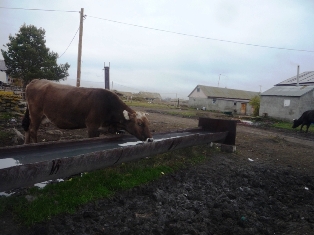Elene Chumburidze
Documentary film of the nongovernmental organization Borjgalo presents current social-legal problems of eco-migrants in Georgia. The film is mostly about eco-migrants from mountainous region of Adjara, who were resettled as a result of natural disasters; the film was prepared in the frame of the project “Advocacy for Eco-Migrants’ Interests.”
Eco-migrants from mountainous regions of Georgia were mostly settled in Khoni, Ninotsminda, Tetritskaro, Tsalka, Marneuli, Akhmeta and Lagodekhi districts. Majority of them have common problems: damaged residential houses, insufficient land, unregistered houses and plots, insufficiency of grass-land. Problems of concrete village also add to eco-migrants problems: drinking water, irrigation water, damaged roads, lack of out-patients and medical service, etc.
Co-author of the documentary Ilia Guchmanidze said relatively better situation is in Lagodekhi and the worst situation is in Marneuli, Khikhiani and Akhali Dioknise.
Alongside the problems of living conditions, registration of properties is also very important for eco-migrants. According to the information of the organization Borjgalo, absolute majority of houses and plots are not registered on them. Some families have owned the property for more than 20 but it was not registered on them. They do not feel themselves protected. They permanently fear that one day state might sell their house on the auction or seize it. Position of the previous government on not registering houses on eco-migrants relied on the doubt that eco-migrants would sell the house and return back to the risk-zone.
Ilia Guchmanidze also underscored problem of plots. He said a peasant cannot live in the village without land. Three or four people own those plots mostly illegally. “Sometimes, eco-migrants work on those plots in exchange of minimal daily reimbursement. Women work from 6:00 am till 8:00 pm for meager salary because those women do not have their own plots. Clans are created in the villages, who have occupied plots. I am not exaggerating the situation but I want to declare that what I saw on the place was modern form of serfdom,” Ilia Guchmanidze said.
After consultations with experts, organization Borjgalo worked out recommendation to grant small credits to eco-migrants. Organization’s representatives believe if state grants 10 000 lari credit with 0% interest rate to each eco-migrant family, they will manage to rent a land, purchase cattle, repair houses and improve their living conditions in general. In five years, the peasants will be able to pay the credit. In parallel to it, agriculture will also be developed.
Ilia Guchmanidze said previous government had incorrect priorities: “I will mention a simple example: did the state have resource to grant credits? Construction of Alphabet Tower in Batumi cost 65 million lari which was allocated from Batumi budget. This money could have been enough for 6500 eco-migrant families to improve their lives. We should decide what is our priority – welfare of 650 families or beautiful Alphabet Tower in Batumi center?”
Deputy Chairman of the parliament, Batumi MP Murman Dumbadze confirmed with humanrights.ge that eco-migrants from Adjara cope with serious social problems. “There are very grave problems. Unfortunately, neither previous, nor Shevardnadze’s government managed to resolve problems. In practice, nobody managed to keep those people in their native regions for the last twenty years for one simple reason – even legislation was not prepared for it. Nobody ever thought of this problem. These people do not have registration and citizenship. I think their number might be 50 000. It is large-scaled problem and parliament already has it on its agenda. A social group will be set up which will work on this problem. We have already started working in this direction.”
Murman Dumbadze added that parliament cooperates with the nongovernmental sector on this issue “who know much more about this field.”
It is noteworthy that there are two categories of eco-migrants: resettled in the frame of state program and independently resettled eco-migrants. Families, who could not involve the state program, were not systemized at all. There is no systemized data base of the total number of eco-migrants in the country. According to final, 2010 official data, 9 000 families were resettled only from Adjara region. However, representatives of the Borjgalo conclude this information is not adequate because number of eco-migrants in concrete villages showed some errors.
News
December 13, 2023
Ethnic minorities outside the peace dialogue
November 6, 2023
‘Peace’ agenda of political parties
Popular
Articles
February 13, 2024




